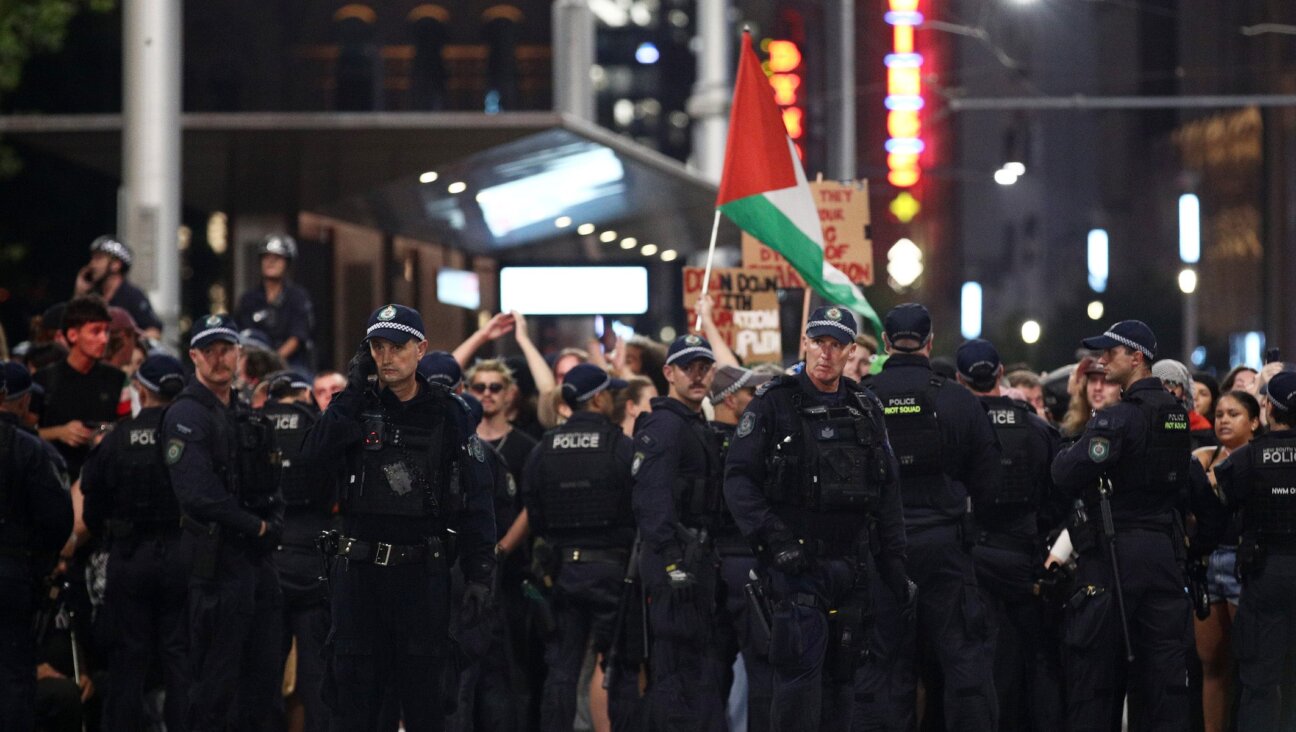‘Seinfeld’ Star Puts Famous Face on Peace Initiative
JERUSALEM — Actor Jason Alexander will tell anyone who asks that he’s nothing at all like George Costanza, the pompous, petty, egocentric character he played on “Seinfeld.” Somehow, though, he can’t help sounding just a bit like his alter ego. Even when he’s flying halfway around the world as an ambassador of peace, he can’t help comparing himself to an idiot.
Take his visit last week to Ramallah. He’d gone there with no real expectations. Yet he admitted that “like everyone else,” when he thought of Ramallah he thought of bombs.
“Like an idiot, you forget people are people,” he told the Forward.
What he found there, in fact, were “wonderful, warm, receptive, concerned, passionate people who were very concerned about letting me see who they are and letting me see where they live and how they live.”
A 44-year-old comic actor with more than 50 films to his credit, Alexander’s three-day visit here made the front pages of all the Israeli newspapers and led evening newscasts, indicative of the series’ wild popularity as well as the Israeli public’s love of visitors, particularly famous ones.
But Alexander was here on serious business. He came to Tel Aviv and Ramallah to promote a grassroots peace initiative sponsored by an organization called One Voice. He spent his time in a series of meetings and briefings with reporters, students and actors, Israeli and Palestinian alike, to yuk up the project, which aims to unite Israelis and Palestinians around a set of common principles.
The nonpartisan One Voice effort is the brainchild of Mohammed Darawshe, an Israeli-Arab political activist, and Daniel Lubetzky, a Mexican-born Jewish-American entrepreneur. Under their plan, Israelis and Palestinians over age 15 are being asked to answer a series of 10 questions about the conflict, including whether a two-state solution is viable, whether a Palestinian state should be demilitarized and whether 1967 borders should be the basis of a negotiated agreement.
Voting takes place through the mail, via the Internet (www.silentnolonger.org) and at booths on university campuses and other public places. Results will be computer-tabulated at the end of each round of voting, after which the questions will be refined and new rounds of balloting held until a consensus emerges. “The challenges are huge, but there might be a chance,” Lubetzky told the Forward. “If there is enough pressure from the Israeli and the Palestinian people to the political leaders, and they start saying, ‘This is what we want,’ then that will provide political cover necessary for the politicians to do what the people want.”
Alexander decided to join the effort, he said, after attending a meeting at the Hollywood home of actors Danny DeVito and Rhea Perlman. Also attending were two members of the organization’s American advisory board,actors Brad Pitt and Jennifer Aniston.
Alexander was frank in admitting that he was trading on his fame to advance his views. That, he said, is one of the few real benefits of fame. “The only use of celebrity that I’ve ever come across is, we can tend to get attention when we open our stupid little mouths,” he said. “So I am here opening my mouth, and reflecting the attention that I get onto something that I think has great merit and great potential. But that is the extent of my participation.”
He said he knows he’ll be criticized for meddling in a political tinderbox and that critics will call him a novice and dreamer. “I’m willing to take those names,” he said with a laugh. “I’ll be okay. They can call me naïve. Forget I’m mixing in. I’m not, actually. I am not here as part of the process, I am not here as a participant. I am not an Israeli. I am not a Palestinian. This is not my conflict. I am not part of the resolution, and regardless of what my opinions may be, I am not part of the process.”
Adhering to his mission as ambassador of a nonpartisan Israeli-Palestinian initiative, Alexander maintained a stance of strict neutrality on sensitive issues like Israel’s security fence and the plan to pull out of Gaza. He answered such questions with a string of “no comment”s, refusing even to discuss whether Hamas was, as Israel insists, a terrorist organization. “Until I hear it come out of their mouth, for myself, then it’s reporting, it’s hearsay to me,” he said. “I don’t trust media reporting, for the most part.”
Despite the neutral pose on this visit, Alexander makes no bones about his identification with Jewish causes. He speaks frequently on behalf of various Jewish groups, particularly the Anti-Defamation League, for which he regularly serves as a volunteer spokesman. He often credits the ADL with awakening his Jewish identity, as a result of a 10-day ADL mission to Israel in 1991 that he has said changed his life by bringing home the vitality of Jewish life in a Jewish state.
Born Jay Scott Greenspan, he grew up in New Jersey, where his father, Alex, held a variety of jobs, including selling insurance, driving a bus and managing accounts for a manufacturing firm, while his mother ran a nursing school. He adopted his stage name at 14 by combining his own first name with his father’s: Jay-son (of) Alexander.
His acting career got off to a great start, he told the Forward, when he played his first leading role — at his bar mitzvah. “It was very meaningful to me as an actor,” he said with a laugh. “I had billing on the marquee outside: ‘Greenspan Bar Mitzvah.’ I was the star. I had all the good songs. I can’t even tell you what my portion of the haftarah was.”
Alexander said it was “great to see what it meant to my parents and grandparents. Unfortunately, it did not have huge importance to me.”
Alexander has his own family now — he has been married to his wife, Daena, for 25 years, and they have two sons: Noah, 8, and Gabriel, 12. But with Gabriel’s bar mitzvah just months away, his own ambivalence leaves him uncertain what to pass on to his son.
“I find myself as a parent very conflicted,” he said. “I’ve actually said to my sons, ‘You must go through this, you must have this education, you must have this experience, primarily because it is vitally important to your grandparents. But I tell you this, if it is an empty experience for you, do not make your children do it for me. It either has to have importance for you, or you make your decision.’ But I am asking my children to do this because for my parents and my wife’s parents, it has great importance.”
















